Interview with Christopher Priest
Christopher Priest made his name in the British New Wave of Science Fiction in the 1970s, and has since proven himself to be one of Britain’s most exciting and consistently challenging novelists. His early novels include Inverted World (1974) and A Dream Of Wessex (1977), which push science fiction to the limit with their mind-bending concepts.
With The Affirmation (1981), Priest moved beyond the limits of SF and begun to write novels that defy categorisation but richly reward sensitive reading. The Prestige (1995) showed Priest’s range and skill by winning both a major genre award in the World Fantasy Award but also a major literary award in the James Tait Black Memorial Prize, and was adapted for film by Christopher Nolan. The Separation (2002) won the BSFA and the Clarke Award.
His stories vary from the destructive legacy of two rival stage magicians in the 1800s to a man who wakes up after an accident to find himself invisible to the strange and unsettling stories of the ever shifting Dream Archipelago, where geography and time themselves refuse to stand still. His latest novel, An American Story (2018), finds him returning to his favourite themes of the fallibility of memory and the ways perception shape reality, but through the prism of the tragedy of 9/11.
Christopher Priest was in London for the launch of his new novel at the Gower Street Waterstones, and was kind enough to speak to the Fantasy Hive before the event.
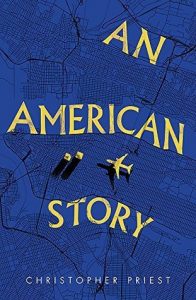
Your new book An American Story is out now from Gollancz. Would you like to tell us a bit about it?
It’s a novel about two things: an event, and the consequences of the event. And it’s based on something called the Thomas Theorem, which is a fairly little known proposition not in maths but in sociology. Which is that the events surrounding some incidents are so important, you tend to forget the incident and remember the events and the consequences of them. There are many examples, quite common ones. For instance, Brexit is a clear example where that’s going on. No one’s going to remember all this debate about No Deal – a year from now we’re all going to be bankrupt. That’s what’s going to matter. And with 9/11, the event itself – awful, tragic, terrible as it was – then four and a half million people got killed in Afghanistan as a result of that. And that’s kind of a big consequence to something where the Americans hold the copyright to the story, and don’t tell the truth.
Reading it I was reminded of the beginning of The Affirmation, where you talk about all prose being a lie. But in The Affirmation is an exploration of how fiction can be used to tell a more real emotional truth than the truth itself. But in An American Story this is turned on its head, it’s about how the narrative can be manipulated, to become a weapon.
Yes, it’s interesting you say that. God, obviously I’m being inconsistent on that, but there are 35 years between the two books! All my books essentially are about fiction. Strip everything away, I’m really interested in writing fantastic literature, and all my books are kind of metaphysically about that, although concealed behind plots and things. And in The Affirmation, the central character can only tell the truth about himself by fictionalising himself, as you say. And in An American Story, everyone is living in the fictional world created by the FBI and the CIA and the White House and the Department of Justice and Department of Defence in Washington, who’ve come up with a particular fictional story, which everyone accepts. It’s very interesting cause there’s a lot of cognitive dissonance going on. People saw the events on TV, they’ve heard what the FBI and the Department of Defence and all the other people say about it, and they accept that. And they’ve also heard that it’s not true, and they won’t accept that. Because the lie is too big. ‘Cause to accept that the US government is telling porkies basically means that all their understanding of how democracy works and their faith in the office of president and their belief in representational democracy is wrong, and it’s too much to take on. So people think, OK, I’ll just go with the story.
It’s really interesting looking at the consequences of that now, both with Trump in the States, and over here with Brexit.
Yes. Well, Trump is a consequence of 9/11. I think the American public, like the public in Britain, have just simply got tired of the establishment. And they’ve been given an opportunity to stick a finger up, or in Britain two fingers! I don’t think the normal British person’s a racist, but they’ve basically opted for a racist policy. But that was more motivated by the thought that there’s all these old Etonians sitting in the cabinet room running their lives. They don’t know anything about what ordinary people are putting up with, what it’s like to live trying to do two part time jobs with three kids and an absent father, and zero hour contracts particularly, and the cruel benefits system, and here comes an opportunity: I can vote against the government, absolutely, they’re going to take the chance. You can’t blame them for that. But the problem is we’ve got to live with the consequences.
Speaking of Brexit, one of the things you portray in the novel is that we get to see some of the consequences further down the line. There’s a nastier, more paranoid England with armed police, whereas Scotland has gone independent and rejoined the EU.
Scotland voted firmly in the EU referendum to remain. And it wasn’t just the majority, it was absolutely every constituency voted to remain. I think the mood’s changed since then, and it hasn’t been tested, but that interested us, that’s why we moved to live in Scotland. Because I like being a European. What I’m doing next week is I’m going to Paris to do a writer’s residency, which is dependent on me being an EU citizen, which this time next year I won’t be able to do. Now we’re living in Scotland, the thing is going pear-shaped so rapidly. The Scottish fishermen mostly voted Brexit, they wanted out, they didn’t want to be pushed around by Brussels, but they’re now realising they’d be better off if they were. It’s a difficult subject. So I had this idea of, after Brexit, Scotland simply does a UDI and reapplies to join the EU, which is not easy to do, but I assume it can be done. And I’ve twisted the knife a bit by making it a Schengen country. So people can fly into Glasgow and Edinburgh without passports.
And then you get the massive border checks as you go into England…
Yes, but also you know there’s a problem with the land border in Ireland. Think of Hadrian’s Wall! But that’s just in the background. I am English, and when I lived in England, I didn’t want Scotland to be independent. I thought it was too much to lose, I was really against it, I was so glad when they voted to stay. Now I live in Scotland I feel quite differently. I don’t know whether I would be in favour of the UDI, but I would certainly be interested to talk about it, to decide.
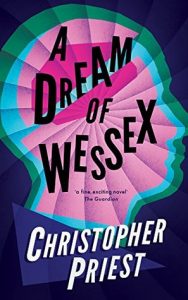 There’s a theme in An American Story of consensus reality versus reality itself, which made me think of A Dream Of Wessex, where you have a group of people imagining a consensus future.
There’s a theme in An American Story of consensus reality versus reality itself, which made me think of A Dream Of Wessex, where you have a group of people imagining a consensus future.
When I wrote A Dream Of Wessex, I discovered there were several academic groups in universities attempting to do something similar, coming to a consensus about the way things might go. Think tanks are based on that. I mean some of the big think tanks are really mighty things, not at all influenced by A Dream Of Wessex. I know there was one particular university in America that was experimenting with hypnotising themselves, doing a consensus reality thing like that. And they started having shared experiences without knowing. It was weird. ‘Cause they do this all the time, this shadowing of futures, and they do computer models, and the point I was trying to make in An American Story was they had spotted social media, and they saw it as a tool that could be bent to their will. In other words, it was about opinions, not about facts. And therefore, if you moved opinion well, if you manipulated it in certain ways, things could be changed, which of course is happening now. I make no secret of the fact that I think social media is a social ill, a bad thing that everyone should give up.
It’s been incredible to see the real-world consequences of this online realm over the past couple of years. It is like something out of one of your books!
It’s massive, isn’t it? There’s the agricultural revolution, the industrial revolution, now the digital revolution. This is the big one. This is worldwide. It’s going to change everything forever. I can’t imagine social media will continue in this form much longer, because basically the governments won’t put up with it. They’re going to pack it in. There will be some form of contact but it won’t be as free. And I would say that’s probably a good thing, personally. There’s a debate in An American Story, about what I call the Platonic dilemma, which was between Aristotle and Plato, who were tempted by the notion of universal literacy. Basically Aristotle said, “No, I think it’s a bad thing, I don’t want people having opinions!” And that is exactly what’s happening now with the internet. It’s full of opinions. And very few facts. And all the facts that are there are very dubious. This is the one thing Trump has got right! There are not many others!
There are so many narratives and counternarratives surrounding what happened on 9/11, and attempting to pick out the truth from the conspiracy theories, and all the different stories that people with different agendas tell…
My novel distinguishes quite carefully between the conspiracy theories, and what they call in America the Truth movement, or Truthers. The thing about conspiracy theories is, conspiracy theories spring up all over the place for everything. I remember the shooting in Las Vegas last year, it was pretty clear what had happened. And yet within a day there was, oh, he was appointed by the CIA, all this sort of thing, and it’s madness. Well, it’s not always madness. I like conspiracy theories sometimes because they can give kind of an alternative glimpse into the way things are. More often than not they’re just mad.
But the Truth movement’s quite different. They’re nearly all professionals, they’re nearly all trained, or qualified. One in particular is the Architects and Engineers for Truth. There’s something like 10,000 have signed up to it, all of whom said ‘when I saw the towers come down on 9/11 my first thought was, that can’t happen’. And they support it with engineering and facts and science. The third law of thermodynamics would prevent the tower from collapsing in that way, the top collapsing down onto undamaged floors below, and then damaging them enough that they collapse down. That cannot happen in science, it doesn’t work. The worst that would have happened is that the top 18 stories would have collapsed through the 18 stories below, but it would have stopped at that point. It wouldn’t have gone all the way to the ground. But this is engineering, this is fact. That is not a conspiracy. Where the US media and the US government say, oh they’re just conspiracy theories, is the consequences of that, if you accept that, who the hell put the explosives in? What were their motives? How did they do it? There are a lot of things unsaid.
This is the first book that you’ve written for a while outside the Dream Archipelago.
I always saw the Dream Archipelago as a sort of metaphorical background. A place where I could set up a story, without having too many fringe things coming in, like what language are they speaking. So in a sense it was a kind of short cut convenience. But gradually the whole thing started to take off in my mind. I liked the idea of a kind of feudal system on each island, but a benign one. And this idea of neutrality, which I think is very interesting. Countries like Switzerland and Sweden now, they occupy a very important role in the world, partly as a cushion, partly as a sounding board. I thought how great would it be, you have two warring nations divided by these islands that won’t have anything to do with them. That was fascinating. And I did a few stories, and then, I didn’t get bored of it, I simply wanted a change. This story’s completely free of it. But then I’ve done others, like The Extremes, A Dream Of Wessex…
People ask if I’m going to go back to it. The trouble with that is that there’s this cult in fantastic writing of world building. And I purposefully designed the Dream Archipelago to be anti-world building. There is no map possible. There’s a story which actually says that they can’t do it. There’s another story that says the problem with the islands is if you fly over them North-South they’re in one shape, you fly over them East-West they look different, and sometimes you go back and they’re not in the same place. And lots of islands have the same names and the same map references, so it’s really anti practical extrapolation into a map or an understandable reality. These are non-literary things, you know, doing bloody maps. People are like, “Oh I like to follow, this drawing here of the Mountains of Madness, and ooh they went down the Slough of Great Deep Depression…” They’re just words. It’s almost impossible now to sell a fantasy novel without a map. And, it just seems to me that that’s completely not literary. Books should create their own maps, so that as you’re reading, anything you can’t see, you can imagine for yourself.
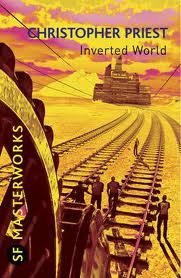 The idea of the perception of reality shaping reality itself links back to Inverted World, where what appears to be a science fictional problem is a perceptional problem.
The idea of the perception of reality shaping reality itself links back to Inverted World, where what appears to be a science fictional problem is a perceptional problem.
Well, what is reality? What you see and what I see, are they the same thing? I mean, what colour’s that wall? Would you say it’s grey? Blue-ish? Black-ish? We might agree, make a consensus where we say, yeah, it’s grey-ish, but how do I know that what you see as grey is what I see as grey? And this is absolutely manifest in things where you hear people talk about science fiction. Sometimes it’s absolutely clear that someone talking to me about science fiction is talking about books I would never read, have no interest in, and the books I write vice-versa, but they might all be science fiction.
There’s also a theme running through your work like The Prestige and The Affirmation of mirror images, doubles or twins.
Well, they’re different things. In The Affirmation, the doubling is really a kind of psychic alternative to one reality, either of which could have been more real than the other. In The Prestige, because it’s all about twins, and identicality, there are others as well…
The Separation…
Oh yeah, that’s got two twins. I think the thing is, I have twins of my own. My children are twins. They’re not identical. But they’re very interesting. When they were kids, they were very similar in some ways, very close in interesting ways. And I suddenly realised, that if you had identical twins, you’ve basically got a kind of critical comment on the other going on the whole time. For instance, with our kids, they were potty trained at different times, they learned to walk at different times. One was ahead of the other, one learned to read a couple of days before the other. In some ways with a single child you just go through in a straight, linear narrative. With a twin, all the time you’ve got this alternate world around them. We found that absolutely fascinating. My twins were born just before I wrote The Prestige, and in fact the working document all the time in the process, was Twins. Twins01, Twins02, Twins03, but that was really because I knew the twist to come. And I really started to get interested in twinship after The Prestige, after the kids were starting to grow up. I mean, they were kind of not an influence, it’s not about the kids at all, but I learned from them.
With The Prestige, the two unreliable narrators each undermine the other; you’re getting these two different perspectives but it becomes impossible to believe either of them because their hatred of each other clearly distorts their perspective so much…
Except that they’re being honest! I remember years ago, somebody said, “Why do you always tell lies?” It’s not true! It’s a bit like you were saying about the perception of reality. It’s almost impossible to do an objectively accurate account of what happened. If I told you now an anecdote about something that happened to me on the train yesterday, I’d leave out all sorts of stuff. Why I was on the train, where I’d been the night before, where I was going to. I’d say, hey, there was this guy on the train and he was doing this, that and the other. So all of a sudden the context changes. It’s no longer literally real. It’s in a suspension of reality. It’s now becoming fiction. And, as I would tell the anecdote, or not just me but anyone, you would shape it. You’re telling a tale, you tell these stories for a purpose. You want to make the other person laugh. You want to surprise them. You want to frighten them. You want to say, aren’t I clever? Or boy I was really stupid! There’s a point to it. And also, it ends. The guy got up, he said blah and off he went. And in real life that never happens. You never get a twist ending. It just stops and you move on to something else.
And so any narrative version of anything from a novel to someone giving evidence in court is completely unreliable. And if you ever read a court transcript of a trial, and lots of them around of murder trials, you’ll often find one witness was saying, “Yes, I saw the accused man, he was walking along with two women and he was holding a knife.” And then the next witness will say, “No I didn’t see the women, but I saw the man and he had a gun.” Neither of them is lying, but they perceive differently. And some of it’s based on what they actually saw, and some on what they think they saw, and some on what they now would expect to see, knowing what happens later. So, it’s very very difficult to create what you would call a reliable narrator. So I love the idea of saying, “OK, this is how it is, this is what happened, I’ll tell you the truth, I’m not going to embellish it, what happened was, I started….” and off you go. Suppose I said, I’ve just come back from Germany. I was on holiday. I went to Berlin, and then I went to Hamburg, and I travelled on the train, and I stayed in the hotel called the so-in-so, and I went to the theatre and I saw this show, then after five days I got the plane back from Düsseldorf to Gatwick, and then we went home. Everything in that account would be completely true. But what you haven’t said is who you were with, why you were there, what happened between Düsseldorf and Hamburg, how did you get there, and much more. Tonnes more. And some of it might be significant. You might have murdered somebody while you were there. It doesn’t take away the truth of what you said. The essential truth is incomplete. So that’s where reliable and unreliable narrators are really interesting. Because you create a tension where the reader can accept what you’re saying, and is correct to do so because you have no other information to go on, and the writer is in a sense wilfully but not deliberately deceiving you. The writer is saying, ‘this is what you need to know for now, later you will hear the other side of the story.’
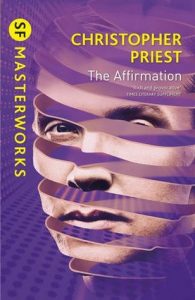 In terms of constructing something like that, how much of the big twist endings or the information you’re withholding do you have planned out beforehand?
In terms of constructing something like that, how much of the big twist endings or the information you’re withholding do you have planned out beforehand?
In general. There’s a moment in The Affirmation where the reader, as it were, finally sees the manuscript. I won’t repeat what the reader sees of that manuscript at that moment. I knew that scene was going to happen before I started the book. But I didn’t know the circumstances in which the reader would be told this, or how it would be done. All I know is I was working towards it consciously all the time. And when some readers say, ooh, I really like that bit, I think, good-oh!
Similarly in The Prestige, where are there are a series of twists, is there a conscious effort of construction?
In magic it’s different. There are quite obviously lies told. Magicians use misdirection, which is a form of dishonesty. The best example is a pack of cards. The magician produces a pack of cards, and it’s got cellophane around it. He takes it off, it crackles, he throws it aside. And inside there’s a pack of cards wrapped in paper with a seal on. And he takes that off and throws that aside, he then fans the cards, he then does the trick. Now the effectiveness of that trick depends on one thing, which is the fact it’s a new pack of cards. Which the watchers and viewers are given every encouragement to think, because everyone’s opened that pack of cards themselves. But how do they know the magician didn’t open it earlier that morning, very carefully, do something to the cards and seal it up? He hasn’t lied to you, but he’s led you to make assumptions based on what you’re seeing. And because you see it, you therefore cannot disbelieve it. “I know it was a new pack, because I saw him opening it! It had the cellophane crackling and he fanned it and I saw all the cards.” Derren Brown does a trick with a pack of cards which he spreads out, he gets the subject to choose one, he says, ‘I’ll make it very quick’, he shuffles and fans the cards like that, he says to the other person, “Now what I want you to do is think of the card, and think of its name, don’t tell me what it is, but I’m thinking something like king, king… king… king… king of diamonds?” At this point the person goes, “How did you know it was that?” And it looks like, well, I know how it’s done, but in fact the cards have been prepared for that king of diamonds to be the most prominent card, in that quick 10 seconds, you can see it and absorb it. It’s as simple as that. No one’s been lied to, no one’s been deceived, but the viewer, or the participant in that case, thinks, oh it was just a random pack of cards, I know because I saw.
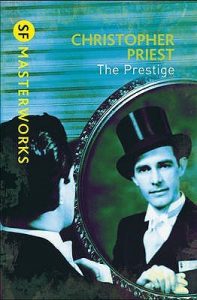 What’s next for Christopher Priest?
What’s next for Christopher Priest?
I’m just about to go to Paris. I’m planning to write a book about a magician working in Paris in the 1920s, and is meeting in the ambience of what is now misleadingly called the Lost Generation, Hemingway and all, and I have a particular agenda. Because all the official account of the Lost Generation in Paris is effectively written by Americans. And what is not written is what the French thought of the Americans there. At any one time between 1922 and 1929 there was between 10 and 20,000 Americans permanently resident in Paris. Which meant it was almost impossible to get a hotel room. It was almost impossible to find an apartment. And the cafés started selling hamburgers. The French hated that. They were kind of flattered and proud that these writers were there, but socially, they were intruders. I’ve kind of got something to play with there. Something I can think about. And I have some plans for what the magic might be. So it’s interesting.
I’ve recently become officially a magician. I am a magician now. I’ve got the button, I haven’t got it with me, but it’s called the IBM, the International Brotherhood Of Magicians. They have a little badge, which every magician will recognise if you wear it. I’ve been inducted into the IBM, on what I assume is an honorary basis. But you have to sign an oath, so I’m not going to give away secrets. I can’t tell you how Derren Brown does his trick with the king of diamonds.
So have you learned any tricks yourself?
No, not really. To me it’s all plot. For me, a magic trick is a story with a beginning, a middle and an end. For me it’s metaphorical. What does interest me is something magicians do called magical thinking. And that sounds like a simple phrase. But what it really means is that there are really only four or five principles of magic. Concealment, disappearance, changing position, changing shape, things like that. So all tricks are effectively based on similar principles of concealment and revelation. And what magicians do is they think of ways of making that more interesting and unusual. Like 25 years ago there was a rash of tricks involving mobile phones. All of a sudden it was great, new tricks were there! And so that’s magical thinking. I mentioned Derren Brown, he’s a master of magical thinking. Most of his illusions are based on very very simple principles that he elaborates, and they go on for twenty minutes, and you get more and more mystified by them. They are extraordinary to watch. But they are very simple illusions at heart. It’s very interesting to me because that’s what novelists do. You get boy meets girl, boy loses girl, boy finds something else and goes off and does this, and you think, there, that’s the whole plot of the novel. 180,000 words!
Thank you Christopher Priest for speaking with us!
Christopher Priest has been writing science fiction since the 1970s. His novels include The Prestige, The Affirmation, and A Dream of Wessex. His latest book, An American Story, was published by Gollancz on September 20th 2018.

